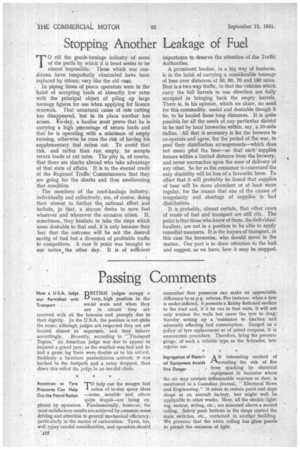Stopping Another Leakage of Fuel
Page 14

If you've noticed an error in this article please click here to report it so we can fix it.
T0 rid the goods-haulage industry of some of the perils by which it is beset seems to be almost Impossible. Those which war conditions have temporarily eliminated haVe been replaced by others; very like the old ones.
_ In piping times of peace operators were in the "habit of accepting loads at absurdly low rates with the principal object Of piling up large tonnage figures for use when applying for licence renewals. That unnatural cause of rate cutting has disappeared, but in its place another has arisen. To-day, a haulier must prove that he is carrying a high percentage of return loads and that he is operating with a minimum of empty running, otherwise he runs the risk of having his supplementary fuel ration cut. To avoid that risk, and rather than run empty, he accepts return loads at cut rates. The pity is, of course, that there are sharks abroad who take advantage of that state of affairs. It is to the eternal credit of the Regional Traffic Commissioners that they are going for the sharks and thus ameliorating that condition.
The members of the road-haulage industry, individually and collectively, are, of course, doing their utmost to further the national effort and include, in that, a sincere desire to save fuel wherever and whenever the occasion arises. If, sometimes, they hesitate to take the steps which seem desirable to that end, if is only because they fear that the outcome will be not the desired saving of fuel but a diversion of profitable traffic to competitors. A case in point was brought to our notice, the other day. It is of sufficient importance to deserve the attention of .the Traffic Authorities.
A prominent haulier, in a big way of business, is in the habit of carrying a considerable tonnage of beer over distances of 50, 60, 70 and 180 miles. Beer is a two-way traffic, in that the vehicles which carry the full barrels in one direction are fully occupied in bringing back the empty barrels. There is, in his opinion, which we share, no need for this commodity, useful and desirable though it be, to be hauled these long distances. It is quite possible for all the needs of any particular district to be met by local breweries within, say, a 20-mile radius. All that is necessary is for the brewers to co-operate and agree, for the period of the war, to pool their distribution arrangements—which does not mean piSol the beer—so that each. supplies houses within a limited distance from the brewery, and never encroaches upon the zone of delivery of any other. So far as the consumer is concerned the only disability will be loss of a favourite brew. To offset that it will probably be found that supplies of beer will be more abundant or at least more regular, for the reason that one of the causes of irregularity and .shortage of supplies is bad distribution.
It is probable, almost certain, that other cases of waste of fuel and transport are still rife. The point is that those who know of them, the individual hauliers, are not in a position to be able to apply remedial measures. It.is the buyers of transport, in this case the breweries, who should move in the matter. Our part is to draw attention to the leak and suggest, as we have, how it may be stopped.




















































